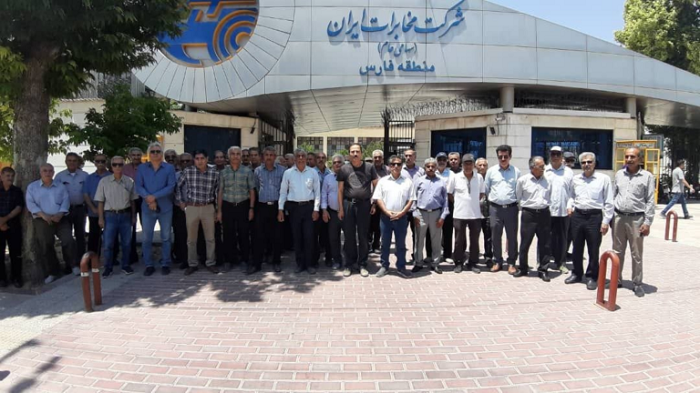
They accuse the administration of squandering billions on clandestine nuclear programs, ballistic missiles, and suicide drones, funding international terrorism, supporting dictators such as Syria’s Bashar al-Assad, and reinforcing domestic oppression.
To date, these expressions of discontent have spread to 282 cities. As per the People’s Mojahedin of Iran (PMOI/MEK), more than 750 protestors have been killed and over 30,000 arrested by the state’s security forces. Protestors have launched attacks on military bases in retaliation to the recent surge in executions, with Shahreza, Yasuj, and Bavi reporting significant incidents.
Retirees and pensioners, severely affected by the financial crisis, are protesting their meager pensions in Shush and Ahvaz. This group, dependent on government stipends, has found their living conditions deteriorate as pensions fail to keep pace with rampant inflation and the depreciation of the national currency. Their demands for fair pensions and settlement of past dues have repeatedly been met with hollow promises from the government.
#IranProtests at a Glance- Tuesday, June 6, 2023 #IranRevoIution pic.twitter.com/9y7YJxJwFr
— NCRI-FAC (@iran_policy) June 7, 2023
Citizens in Zanjan are voicing discontent over unfulfilled housing commitments by state companies, while defrauded investors in Varamin are demanding the return of their funds, leading to confrontations with anti-riot units.
Furthermore, there is an alarming increase in state-sanctioned executions, with multiple cases reported in Karaj Central Prison and Kerman Central Prison in the past week. The Iran Human Rights Center and the Hengaw Organization for Human Rights have documented these incidents, citing approximately 150 executions since May 1.
June 7 – Varamin, Tehran Province, #Iran
Defrauded investors held a gathering to demand their stolen money be returned. Authorities responded by dispatching anti-riot units to attack and disperse the crowd.#IranRevolutionpic.twitter.com/9hVxNbLpvI— People's Mojahedin Organization of Iran (PMOI/MEK) (@Mojahedineng) June 7, 2023
Simultaneously, a severe shortage of drinking water in the town of Taft has caused further public outrage, with locals protesting the government’s misallocated priorities. Activists highlight the irony in President Raisi’s pledge to fund 12 hospitals in Indonesia while Iranian citizens grapple with dire economic and societal conditions.
Adding to the labor unrest, workers of the Khorasan Steel Complex in Firouzeh, interns of the Kermanshah University of Medical Sciences, and nurses in Yasuj have initiated protests against poor wages and working conditions. The town of Abbas Abad in Mazandaran Province is experiencing turmoil over property confiscations by the government, resulting in the tragic deaths of three local youths.
June 6 – Abbas Abad, Mazandaran Province, northern #Iran
People are protesting a regime-judge's verdict issued today allowing authorities to confiscate locals' property.#IranProtests pic.twitter.com/cM1kBZ5g4Mpic.twitter.com/gUL58qCK1v— People's Mojahedin Organization of Iran (PMOI/MEK) (@Mojahedineng) June 6, 2023
As Iran teeters on the brink of socio-economic collapse, its citizens are calling for urgent change, thus fueling a revolution that has been 265 days in the making.

MEK Iran (follow us on Twitter and Facebook), Maryam Rajavi’s on her site, Twitter & Facebook, NCRI (Twitter & Facebook), and People’s Mojahedin Organization of Iran – MEK IRAN – YouTu







